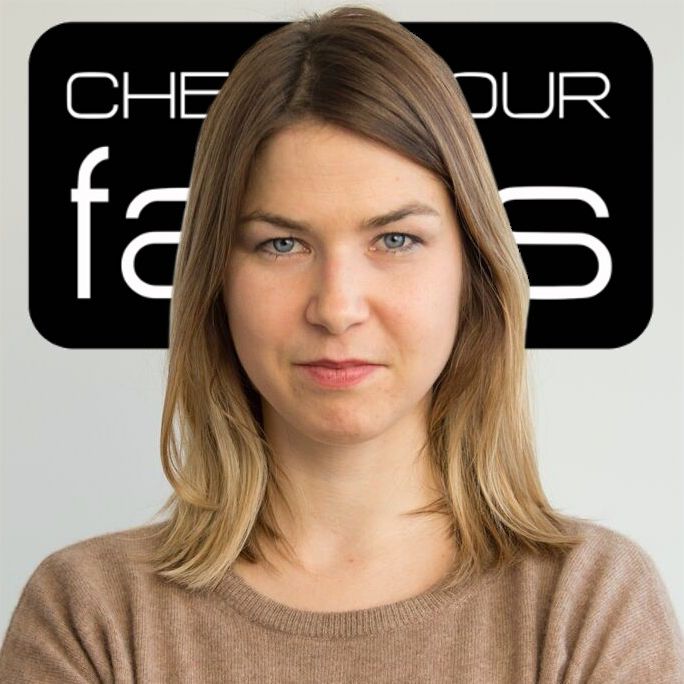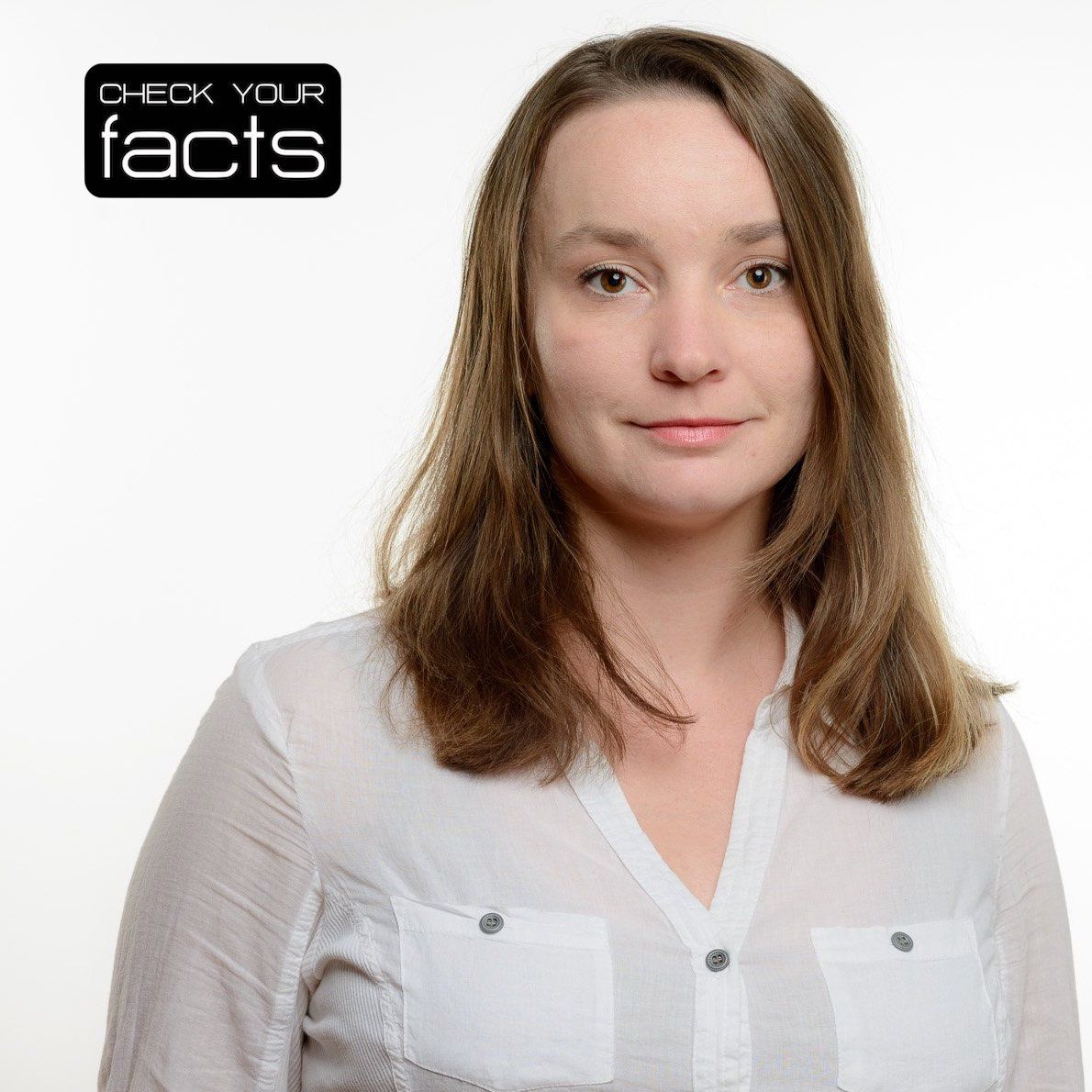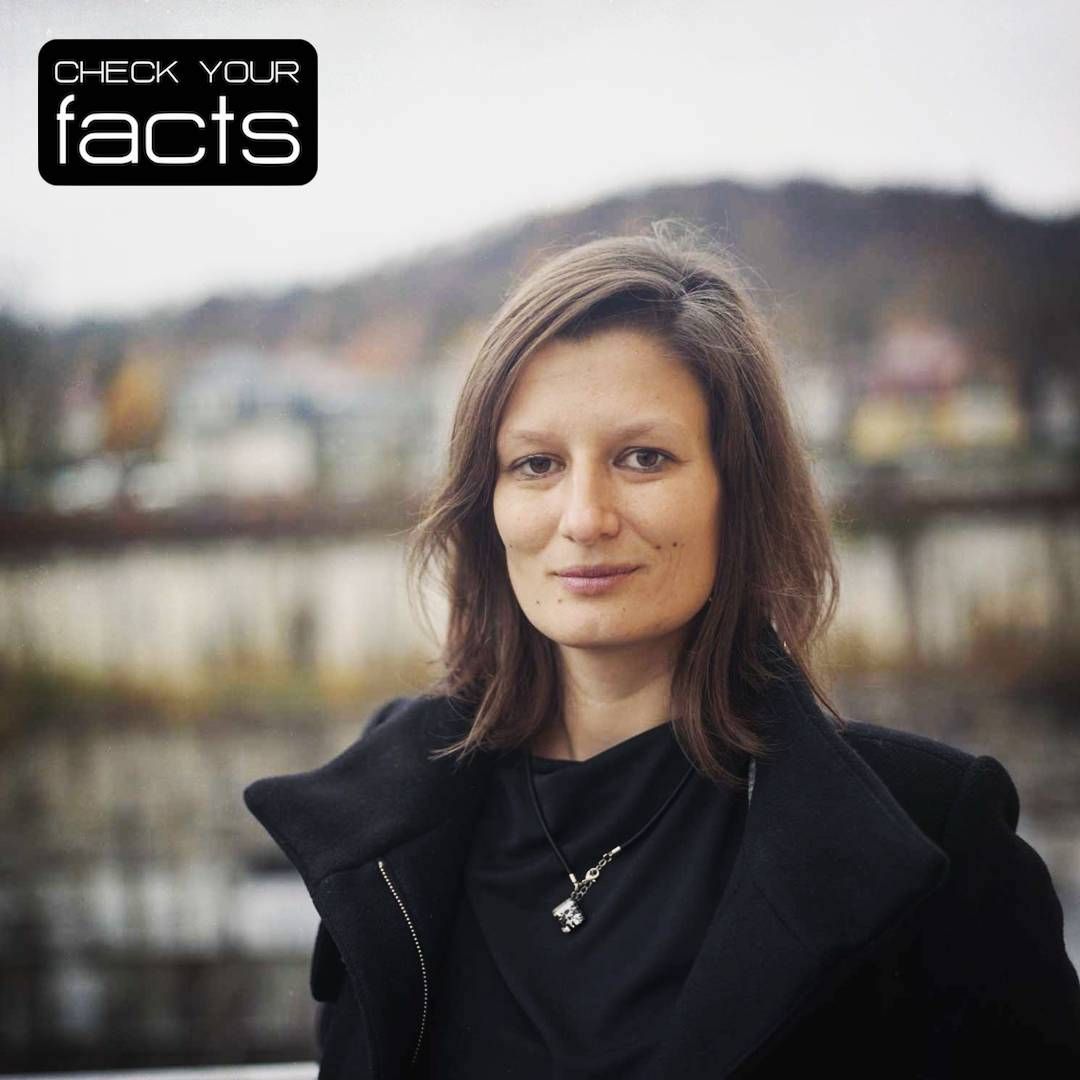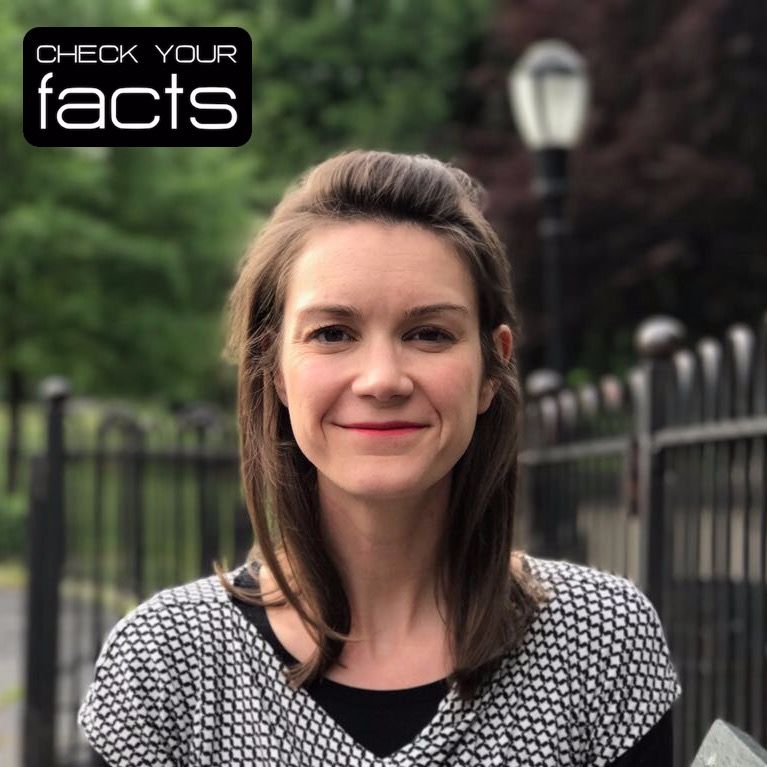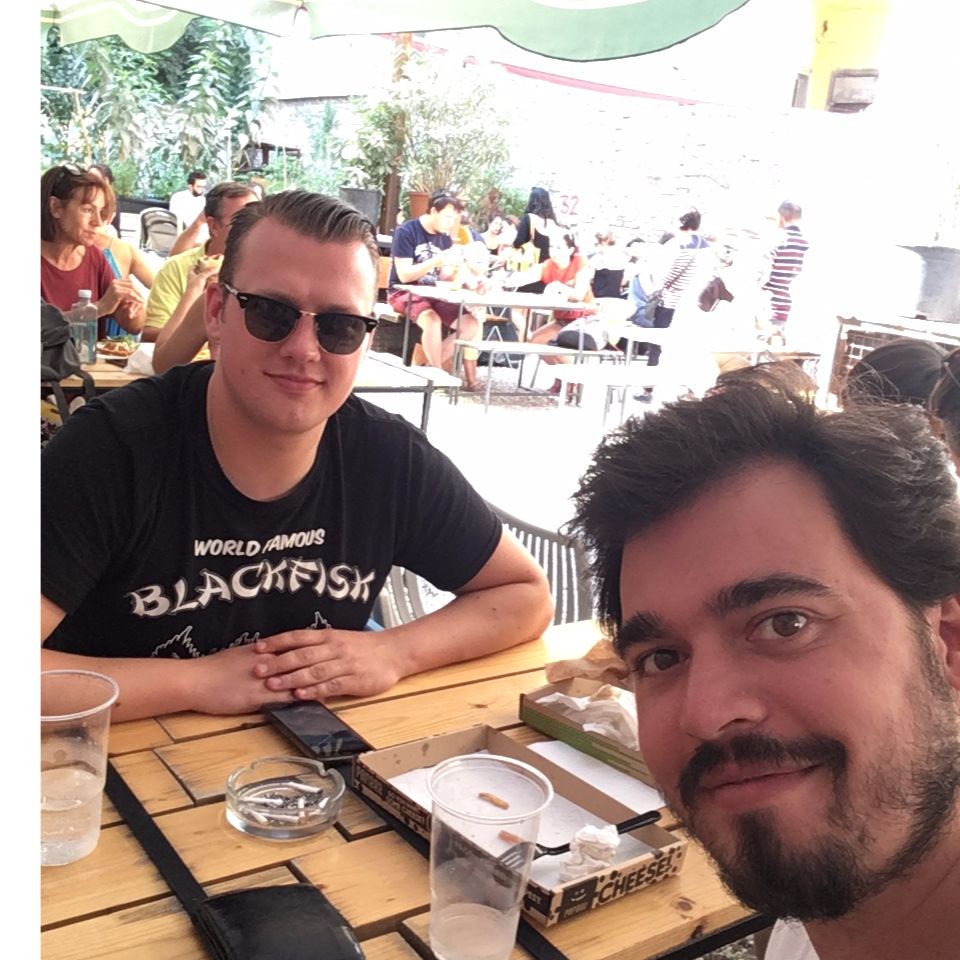Discover Check Your Facts
Check Your Facts

Check Your Facts
Author: Dávid Tvrdoň & Marc Biskup
Subscribed: 19Played: 161Subscribe
Share
© Dávid Tvrdoň & Marc Biskup
Description
We are David & Marc. We love to talk about everything related to the digitalisation. On this podcast we do this – with journalists & digital media people from all around the world.
42 Episodes
Reverse
Jan Kuciak (27) and his fiancée Martina Kušnírová (27) were murdered because of Jan's investigative work. We talk about the events and its impacts on Slovak and European journalism.
Condolences: www.allforjan.com
His last piece of work
in Slovakian: www.aktuality.sk/clanok/568007/talianska-mafia-na-slovensku-jej-chapadla-siahaju-aj-do-politiky/
in English: www.politico.eu/article/jan-kuciak-last-story-italian-mafias-tentacles-reach-into-slovak-politics/
in German: www.bild.de/politik/ausland/kuciak-jan/letzter-artikel-kuciak-54960746.bild.html
Eva Schulz is a journalist, online video show host, presenter and producer.
Currently she is hosting Deutschland3000, a Facebook show by German public broadcasters, that covers politics for a millennial audience.
Prior to that, she co-created Hochkant, a Snapchat news channel for 14- to 19-year-olds.
Eva has started blogging very young and her first foreign language as she puts it was HTML.
We had a very deep dive into online video, platforms and formats.
Twitter: https://twitter.com/evaschulz
Instagram: https://www.instagram.com/evaschulz
Facebook: https://www.facebook.com/evaschulz
Deutschland 3000: https://www.facebook.com/Deutschland3000/
Photo credit: Alex Janetzko
Bettina Figl is a reporter at Austrian newspaper Wiener Zeitung. But she is also a research fellow at The Reuters Institute for the Study of Journalism at the University of Oxford. There she published a paper about data journalism and small newsrooms.
She talks with us at Check Your Facts podcast about how she managed to find her way into Oxford University and what she found out researching several newsrooms. This may help you implementing or strenghten data driven modules in you newsroom as well.
When Bettina is not writing papers on digital journalism or working for Wiener Zeitung she is organising an event in Vienna called „Aufmacher“ („lead story“). She and her colleagues invite journalists to talk — very casually — about their job. The best thing: it is free and open for everyone.
As usual we also talk about the media landscape and current issues in the guest’s homecountry which is Austria this time.
Again, you will find many insights on our guest and her work — and even more.
Eva Mošpánová is a journalist for the Czech public radio, she writes for the iRozhlas.cz, which is a fairly newly developed news website of the broadcasting company.
We spoke with Eva, because she knows the Czech media market, she has covered it in the past writing for Marketing & Media magazine and also worked for other different media outlets.
Czech republic has seen many changes in the media landscape in the last few years, when oligarchs and politicians bought up stakes in traditional media and many journalists left them to start independently operated smaller news operations.
Also the fake news problem has been a huge problem as many alternative media emerged and some of them became widely popular.
After the Czech presidential elections a wave emerged, similar to the one in USA in the end of 2017, when people started publicly sharing that they bought a subscription for a newspaper or online website they trust.
We talked about all of this. Listen to our interview.
Twitter: ht
We spoke with Taja Topolovec, the co-founder of Pod črto (in Eng., ‘The Bottom Line’). It is a Slovenian independent and non-profit media outlet focusing on investigative reporting, data journalism and in-depth stories, founded in September 2014.
Their projects include in-depth analysis of the prevalence and reasons for violent crime in Slovenia, uncovering corruption among Slovenia’s mayors and investigating fraud, mismanagement of European funds, illegal gathering of personal information by Slovenian police (last story), environmental issues, systematic analysis of health system and poverty in Slovenia.
Because investigative journalism in Slovenia could be also translated as “researching”, Pod črto journalists were at first perceived as scientists. So first they had to launch a communication campaign explaining what investigative journalism is and what they intend to do.
What did we talk about:
• history of Pod črto and how did their crowdfunding campaign go
• the problem with inv
Karim Maassen is a Dutch entrepreneur and web fanatic, he is also the founder of nwzer.
nwzer is an AI and blockchain assisted, user-generated news agency. It is the world’s first artificial intelligence & blockchain powered citizen journalism platform.
According do Karim, nwzer seeks to harness the wisdom of the crowds, remove advertising from the equation and build on trust.
We had a long discussion about blockchain, why he would rather not use the word when explaining nwzer and how he sees the technology being used in journalism.
Karim Maassen
https://twitter.com/KarimMaassen
http://www.karimmaassen.com/
nzwer
Website: http://www.nwzer.com/
Twitter: https://twitter.com/nwzer
Sign-up for alpha testing: https://www.producthunt.com/upcoming/nwzer
Civil, the blockchain-based journalism marketplace http://www.niemanlab.org/2017/10/civil-the-blockchain-based-journalism-marketplace-is-building-its-first-batch-of-publications/
How the Blockchain is Redefining Trust https://www.wi
On this week's and this year's last podcast episode we spoke to three journalists from Estonia, Latvia and Lithuania about what is happening with media and journalism in their countries.
Liepa Zelniene is a political journalist for 15min in Lithuania. In 2016 she has started a fact checking unit inside her newsroom.
Marian Männi is a journalist, media analyst and data fan. She has worked for the biggest Estonian media and is the co-founder of a fixing agency called fixers.press.
Filips Lastovskis is a political journalist for Delfi in Latvia. He is interested in Education and European Union politics.
---
What have we talked about in this episode
• Baltic media crash course 101
• Public vs. private media journalism
• Political influence
• Russian influence
• Best recent media developments
David talks about the daily news podcast that SME.sk in Slovakia has launched one month ago. The podcast reached 100.000 listens (plays, downloads…) in one month.
At the beginning there was a two-week period experimenting with different formats and after that the podcast went live.
If you want to know more about this, listen in.
Related reading:
https://medium.com/check-your-facts/here-is-why-the-podcast-revolution-has-not-happened-in-europe-yet-39d9807f95b8
Johannes works for Die Süddeutsche Zeitung at their Brand Studio and also works on innovation there. He is interested in the future of publishing, advertising, also AI and chatbots.
We talked with him about branded content and native advertising, chatbots, AI and voice assistants.
Links:
Twitter: https://twitter.com/Klingebeil
Instagram: https://www.instagram.com/klingebeil/
Newsletter (german): http://johannesklingebiel.de/
Facebook group "Edgeland Reisegruppe": https://www.facebook.com/groups/131575447543200/
Johannes @ Medium: https://medium.com/@Klingebeil
Thoughts on Journalism Medium publication: https://medium.com/thoughts-on-journalism
Katharine Viner (The Guardian is now funded by more than 800,000 supporters) https://www.theguardian.com/membership/2017/oct/26/together-we-are-safeguarding-the-guardians-independent-journalism
People writing on future to follow (recommended by Johannes):
Amy Webb: https://twitter.com/amywebb
2018 Tech Trends For Journalism Report: https://
Federica Cherubini is the International Head of Knowledge Sharing at Condé Nast International. Her role leverages and supports the exchange of knowledge, ideas, contacts and best practice cases between editorial, commercial and product teams of the CNI's portfolio across eleven countries.
Previously, she was part of the Digital News Project team at the Reuters Institute for the Study of Journalism in Oxford, for which she wrote, together with Director of Research Rasmus Kleis Nielsen, the report Editorial analytics: how news media are developing and using audience data and metrics. She was also one of the co-authors of the reports The future of online news video and The Rise of Fact-Checking Sites in Europe.
From 2010 to 2016 she worked for the World Association of Newspapers and News Publishers (WAN-IFRA) on projects focused on examining how journalism's present will lead to its future.
She is one of the co-organisers of Hacks/Hackers London, which brings together journalists (“hac
Lea Berriault is the managing editor of NewsMavens, currently overseeing the day-to-day editorial activities of NewsMavens.com, a Google DNI-funded daily news roundup from top women editors in Europe.
NewsMavens is a collaboration between partnering news organizations. Each newspaper, broadcaster, magazine or portal has designated a woman journalist or editor to curate stories from their media to our collective round-up.
Newsmavens: https://newsmavens.com/
Facebook: https://www.facebook.com/NewsMavens/
Twitter: https://twitter.com/NMavens
Podcast - Stories from the Eastern West http://storiesfromtheeasternwest.com/
Stories from Eastern West
http://storiesfromtheeasternwest.com/en
Slovak publishers now know better than to panic about Facebook Explore
https://spectator.sme.sk/c/20686863/slovak-publishers-now-know-better-than-to-panic-about-facebook-explore.html
Kat Downs Mulder is Graphics Director at The Washington Post. She and her team are responsible for infographics, news apps and digital story design at the Post.
We met her at the News Impact Summit in Budapest, where Kat was presenting the way they do the graphic work at the Washington Post. We decided that you also need to know this and so we invited her to talk about the Post's graphic development, their different approaches on mobile and social – and on the newspaper.
In the end you may find out what Kat is looking for in a perfect team member, but see for yourself ;)
Kat Downs Mulder
TW: twitter.com/katdowns
FB: facebook.com/katdowns
Links
Post Graphics: twitter.com/PostGraphics
Open Source Tools by Knight Lab: https://knightlab.northwestern.edu/projects/
Filip Struhárik is editor and social media manager at Denník N, one of Slovakia's news platform. He recently discovered a huge loss of media pages' reach on Facebook and wrote about it.
We talk with him about the tests Facebook is doing in Slovakia, Sri Lanka, Serbia, Bolivia, Guatemala and Cambodia (plus Indonesia) where all page posts are banned from the Newsfeed and put into its new Explore feed.
Filip Struhárik
TW: https://twitter.com/filip_struharik
FB: https://www.facebook.com/struharik
Updated Medium blog: https://medium.com/@filip_struharik/biggest-drop-in-organic-reach-weve-ever-seen-b2239323413
Links
Atlantic: https://www.theatlantic.com/technology/archive/2017/10/when-the-facebook-traffic-goes-away/543828/
Guardian: https://www.theguardian.com/technology/2017/oct/23/facebook-non-promoted-posts-news-feed-new-trial-publishers
BBC: http://www.bbc.com/news/technology-41733119
Bali, Indonesia: https://www.travelfish.org/blog/2017/10/24/new-wordpress-newsfeed/
CNN video ad: htt
Emily Goligoski is Research Director for the Membership Puzzle Project, which is is founded by NYU professor Jay Rosen’s Studio 20 program and De Correspondent.
Emily acts as an advocate for news consumers and delivers actionable insights to media organizations. She was the first user experience research lead in The New York Times newsroom and brought design research to Mozilla Foundation. She is a board member of the education non-profit Youth Radio and holds degrees from Northwestern and Stanford.
We talked about her work at the Membership Puzzle Project and she shared some of the research they are doing. It is definitely worth you while so listen to what Emily has to say about memberships and the future of journalism and audience relationship.
Emily Goligoski
Twitter: https://twitter.com/emgollie
LinkedIn: https://www.linkedin.com/in/emilygoligoski
Web: www.emilygoligoski.com
Membership Puzzle Project: https://membershippuzzle.org/
MPP on FB: https://www.facebook.com/Membership
We talked to Beata Biel of TVN 24 who was a trainer for Google News Lab, traveled around many european newsrooms and has a lot to share about her experiences.
Beata Biel
Twitter: https://twitter.com/beatabiel
Instagram: https://www.instagram.com/beatabiel/
Web: https://beatabiel.com/
VSquare: https://vsquare.org/investigations/
Onet.pl: https://www.onet.pl/
Onet app on Android: https://play.google.com/store/apps/details?id=pl.onet.onethd
Onet app on iOS: https://itunes.apple.com/pl/app/onet-wiadomo%C5%9Bci/id473648173?l=pl&mt=8
TVN (kontakt 24): https://kontakt24.tvn24.pl/
Outriders: http://outride.rs/
Frontline PBS: http://www.pbs.org/wgbh/frontline/
After Solitary 360° (2017 Excellence in Immersive Storytelling winner): https://www.youtube.com/watch?v=G7_YvGDh9Uc
Frontline 360 videos on FB: https://www.facebook.com/frontline/videos/10153361384391641/
Marc and David met for the first time on a conference in Budapest, here is a quick dispatch, a proper episode coming next week.
For the first time we speak to a Hungarian journalist. His name is András Pethő and he is the co-founder & editor at the investigative project called Direkt36.
András spent much of his 14-year-long journalism career at Origo, with some longer stints abroad. He worked for 15 months for the BBC World Service and did two journalism fellowships in the United States. In 2013 he spent 8 months with the investigative unit of The Washington Post.
We talked to András about investigative journalism in Hungary and journalism in general under the prime minister Viktor Orbán, who likes to use the same language as Donald Trump when it comes to media.
Also, András told us how they are approaching their membership model and explained us all the different distribution channels they are using. Listen and if you like the podcast, be sure to share it and tell your friends.
Apple Podcasts subscribe: http://bit.ly/FactsPod
RSS subscribe link: http://bit.ly/FactsPodRSS
András Pethő
Twitter: https://twit
Why is Germany so precise when it comes to law making? And does this affect the rest of Europe?
Peter Hense is a lawyer in Leipzig, Germany, and is specialised in technology and media law.
In this episode we talk with him about german law drafts affecting Google and Facebook and what these platforms think about that. Yes, law is complex, but Peter explains it in an understandable way.
Peter Hense
>> Twitter: twitter.com/peterhense
>> LinkedIn: linkedin.com/in/peter-hense-19861318/
Spirit Legal
>> Website: spiritlegal.com/en/
>> YouTube: youtube.com/channel/UCTgWDV8FQzYWG9iFfGWMtWg
>> Facebook: facebook.com/spiritlegal
Google News case in Germany (ancillary copyright/Leistungsschutzrecht
http://www.pcworld.com/article/3195443/internet/google-case-raises-doubts-about-german-news-copyright-law.html
Come and meet us at News Impact Summit in Budapest
newsimpact.io/registration
How to change journalism for better? Albertine Piels and Nienke Huitenga from Hackastory have some tips and also teach us how to analyze our audience (but you have to listen all the way till the end).
Albertine and Nienke both work and are Hackastory which has a very clear mission: Changing journalism for the better.
Their work formula goes like this: Idea + Experiment + Test = WOW
In the podcast episode we talk about Hackastory and their mission, we dive deep into hackathons and find out why Marc is a perfect example. Also we talk a lot about newsgames and give a lot of examples.
This was the first podcast we did with a camera on while recording and it was so much fun, hope you enjoy it as well.
>> Albertine Piels (Director of Hackastory)
Twitter: https://twitter.com/AlbertinePiels
LinkedIn: https://www.linkedin.com/in/albertinepiels/
>> Nienke Huitenga (Creative mastermind)
Twitter: https://twitter.com/wzzzt
LinkedIn: https://www.linkedin.com/in/nienkehuitenga/
>> Hackastory
We talked to Jakub about his newly founded project/initiative Outriders about how he is building it, what is the thinking behind content and distribution and what are his goals.
Jakub has been in media and journalism in Poland for some years now, working on open data and travel blogging. He also tells us a little bit about the media situation in his country.
Apart from that we talked a lot about podcasting in Europe, about different distribution channels and why newsletters are still very important.
Jakub Gornicki
Twitter: https://twitter.com/jakubgornicki
Facebook: https://www.facebook.com/jakubgornicki
Outriders
Web: http://outride.rs/en/
Twitter: https://twitter.com/outrid3rs
Facebook page: https://www.facebook.com/outrid3rs/
Facebook group: https://www.facebook.com/groups/646733595509136/
Joe Sacco’s Comics Journalism
https://theculturetrip.com/europe/malta/articles/the-graphic-story-of-joe-sacco-s-comics-journalism-combining-war-art-and-reportage/
IRL podcast episode about N




